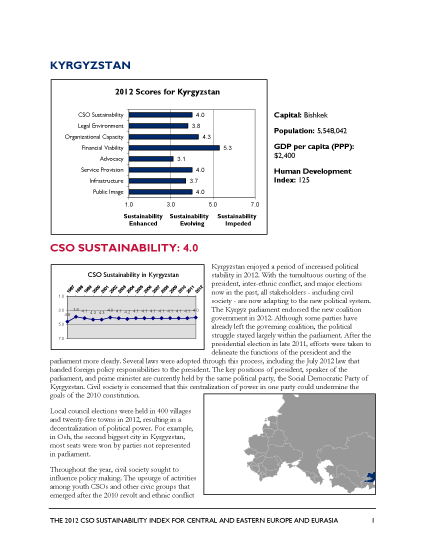CSO SUSTAINABILITY: 4.0
Kyrgyzstan enjoyed a period of increased political stability in 2012. With the tumultuous ousting of the president, inter-ethnic conflict, and major elections now in the past, all stakeholders - including civil society - are now adapting to the new political system. The Kyrgyz parliament endorsed the new coalition government in 2012. Although some parties have already left the governing coalition, the political struggle stayed largely within the parliament. After the presidential election in late 2011, efforts were taken to delineate the functions of the president and the parliament more clearly. Several laws were adopted through this process, including the July 2012 law that handed foreign policy responsibilities to the president. The key positions of president, speaker of the parliament, and prime minister are currently held by the same political party, the Social Democratic Party of Kyrgyzstan. Civil society is concerned that this centralization of power in one party could undermine the goals of the 2010 constitution.
Local council elections were held in 400 villages and twenty-five towns in 2012, resulting in a decentralization of political power. For example, in Osh, the second biggest city in Kyrgyzstan, most seats were won by parties not represented in parliament.
Throughout the year, civil society sought to influence policy making. The upsurge of activities among youth CSOs and other civic groups that emerged after the 2010 revolt and ethnic conflict continued. The government is increasingly expected to deliver on its promises to reform the judiciary and step up the fight against corruption.
The overall sustainability of civil society improved slightly in 2012. Improvements were noted in legal environment, advocacy, and public image, while organizational capacity, financial viability, service provision, and infrastructure all remained fairly stable.
There are approximately 11,500 CSOs registered in Kyrgyzstan. It is estimated that only about 1,500 of these are currently active as many inactive organizations remain on the books due to the complicated procedures to close and de-register an organization.








Comment
Make a general inquiry or suggest an improvement.